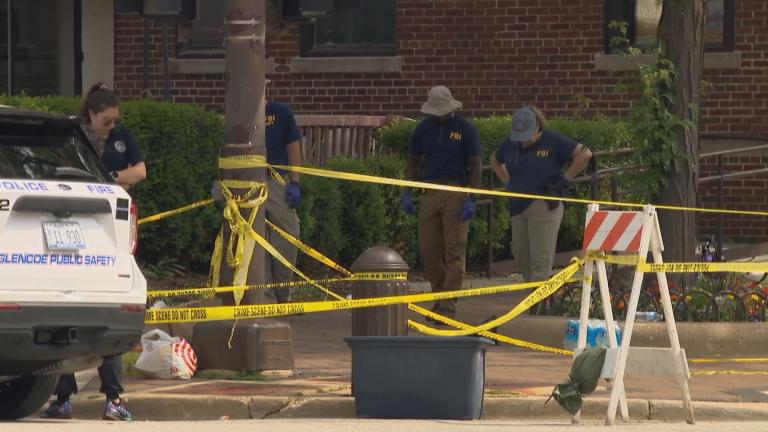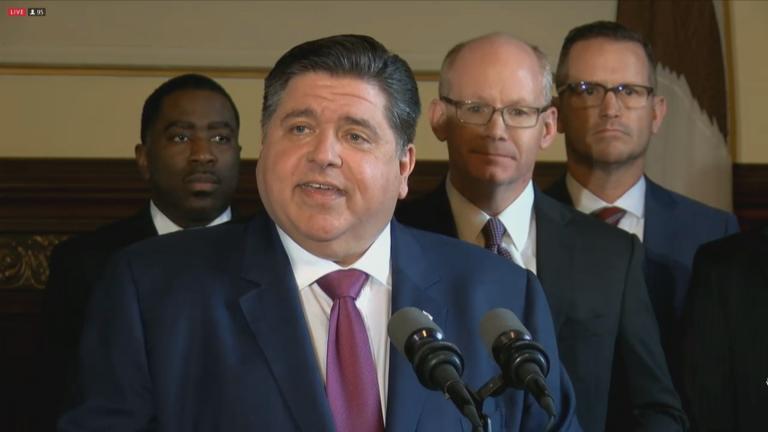With two days of legislative session left before Illinois becomes the first state to completely do away with cash bail, key Democratic legislators are out with a plan that will change the SAFE-T Act.
The criminal justice law was front and center in November’s midterm elections. Critics said it will make Illinois less safe by treating those accused of crimes with too much leniency. Supporters say it contains much-needed reforms to a system that disadvantages the poor.
State Sen. Robert Peters, D-Chicago, said his party’s sweeping election wins demonstrate that Illinois residents are on board with the law.
Still, Peters said advocates had always known they would have to make tweaks and clarifications.
That’s what Peters says the amendment he introduced Wednesday (Senate Amendment 1 to House Bill 1095) does, while keeping intact the central tenets of what advocates had been trying to accomplish — overhauling a racist system that punishes the poor.
“We've had serious conversations with stakeholders to get to this point. I believe that this is a really good trailer bill, I believe that this is a really good opportunity for the state of Illinois and I want to make it very clear this puts Illinois at the forefront of pretrial justice,” Peters said.
One of Republicans’ and state’s attorneys’ major concerns has been that the legal standards were too narrow for determining when a defendant could be kept in jail as they await trial.
Peters’ proposal addresses that by expanding the list of crimes for which someone can be denied pretrial release. It now includes charges such as arson, burglary, second-degree murder and kidnapping.
Another source of frustration was the standard by which a judge could determine if an accused individual is potentially dangerous and should be detained rather than released.
The current language holds that the standard is if the accused “poses a specific, real and present threat to a person” – a bar many prosecutors say is too targeted.
The proposed new language changes it so that in order for someone to be denied pretrial release, it must be on the grounds they present “a real and present threat to the safety of any person or persons or the community, based on the specific articulable facts of the case,” with the burden of proof on prosecutors.
Republican state Rep. Patrick Windhorst, who previously served as the state’s attorney for Massac County, said he takes most of those changes as “vindication.”
“For the last several months, we have been accused of misleading people, being disingenuous, being fear mongers. And then I read this amendment and most of the issues that we raised are included,” he said. “Detainable versus non-detainable offense, we were told ‘there’s no such thing.’ And then you read specific offenses we mentioned as listed in the bill. We were correct in what we were saying in raising those flaws.”
Peters, however, said the changes do not reflect an admission of fault; rather that laws are frequently followed up on and amended with trailer legislation.
Critics also say as written, someone on electronic monitoring would have to be offline for a full two days before prosecutors could do anything about it. In the new version, that language is deleted.
Another section of the proposal sets forth what’s to happen with those who are in custody come Jan. 1: Defendants will be entitled to hearings, with priority going to those who may have been in different circumstances had their arrest been in 2023 rather than before.
Peters demurred on whether other changes were made in light of a lawsuit brought by dozens of state’s attorneys, seeking to strike the law from being implemented. He said he could not comment given ongoing litigation.
It’s possible, even likely, additional edits will be made to the amendment on Thursday, as it's set for a full day of hearings and debate in Springfield.
Lawmakers are set to adjourn Thursday, and not return until a lame-duck session in early January – making it the final time for the SAFE-T Act to be dealt with before its pretrial release provisions take effect.
Windhorst said despite the changes that address some concerns, he has more, and will not be able to support the proposed revisions.
But key constituencies, including those that had lobbied for fewer changes, are on board enough with the compromise language that they won’t stand in its way.
For example, the Cook County Public Defender’s office is taking a neutral stance.
Given the quick timeline, the measure requires super-majorities to pass. Democrats have more than enough members to meet that threshold, and Gov. J.B. Pritzker has called for clarifications to the SAFE-T Act to pass during the veto session.
Peters appeared confident Wednesday morning the measure has the support it will need to pass. He said the mission is to extinguish cash bail in Illinois come January first, a historic change, such that “after all these years and after all these conversations, after all this talk, the Pretrial Fairness Act, as it was intended, will go into effect, and we will get this done and it will be great for the system and it will be great for working class Illinoisians.”
Follow Amanda Vinicky on Twitter: @AmandaVinicky








